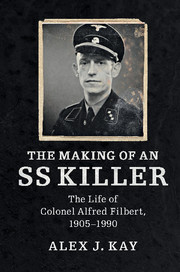Book contents
- Frontmatter
- Contents
- List of illustrations
- List of tables
- Acknowledgements
- List of abbreviations
- Glossary
- Introduction
- 1 ‘I went to school with quite a number of Jewish co-religionists and never knew hatred for Jews’: childhood, youth and early adulthood, 1905–1932
- 2 ‘In terms of his character he is irreproachable in every respect’: Nazi Party membership and career in the SS Security Service, 1932–1939
- 3 ‘Pity that the scoundrel didn't perish’: brother's imprisonment and career stagnation, 1939–1941
- 4 ‘So, we've finished off the first Jews’: SS-Einsatzkommando 9 and deployment in the East, June–July 1941
- 5 ‘In Vileyka, the Jews had to be liquidated in their entirety’: genocide of Belarusian Jewry, July–October 1941
- 6 ‘Was it thinkable that I, a jurist and a soldier, would do such a thing?’: suspension from the Reich Security Main Office and reinstatement until the war's end, 1941–1945
- 7 ‘My son, who has not yet returned home from the war’: post-war submergence and reintegration into West German society, 1945–1959
- 8 ‘A trial of this magnitude has never previously taken place before a German court’: arrest and trial, February 1959–June 1962
- 9 ‘A limited, lower middle class, status-and-promotion seeking philistine’: imprisonment and early release, 1962–1975
- 10 ‘A chess game of egos’: Wundkanal and aftermath, 1975–1990
- Concluding thoughts
- Notes
- Sources and literature cited
- Index
Concluding thoughts
Published online by Cambridge University Press: 05 April 2016
- Frontmatter
- Contents
- List of illustrations
- List of tables
- Acknowledgements
- List of abbreviations
- Glossary
- Introduction
- 1 ‘I went to school with quite a number of Jewish co-religionists and never knew hatred for Jews’: childhood, youth and early adulthood, 1905–1932
- 2 ‘In terms of his character he is irreproachable in every respect’: Nazi Party membership and career in the SS Security Service, 1932–1939
- 3 ‘Pity that the scoundrel didn't perish’: brother's imprisonment and career stagnation, 1939–1941
- 4 ‘So, we've finished off the first Jews’: SS-Einsatzkommando 9 and deployment in the East, June–July 1941
- 5 ‘In Vileyka, the Jews had to be liquidated in their entirety’: genocide of Belarusian Jewry, July–October 1941
- 6 ‘Was it thinkable that I, a jurist and a soldier, would do such a thing?’: suspension from the Reich Security Main Office and reinstatement until the war's end, 1941–1945
- 7 ‘My son, who has not yet returned home from the war’: post-war submergence and reintegration into West German society, 1945–1959
- 8 ‘A trial of this magnitude has never previously taken place before a German court’: arrest and trial, February 1959–June 1962
- 9 ‘A limited, lower middle class, status-and-promotion seeking philistine’: imprisonment and early release, 1962–1975
- 10 ‘A chess game of egos’: Wundkanal and aftermath, 1975–1990
- Concluding thoughts
- Notes
- Sources and literature cited
- Index
Summary
‘But the active ones, they were all National Socialists.’ This is how Filbert assessed the nature of participation in the Nazi Movement almost forty years after the end of the war. Filbert actively pursued a career in the Nazi security apparatus. He volunteered for service in the SS-Einsatzgruppen in the war of annihilation against the Soviet Union, and he displayed particular radicalism in implementing his commission to murder Soviet Jewry. Filbert can be regarded as falling into at least one (and quite possibly four) of the five categories of ‘ordinary people’ identified by the sociologist Michael Mann in his analysis of over 1,500 biographies of perpetrators of Nazi genocide: he was a ‘materialist killer’ (or careerist). In the words of Dr Henry V. Dicks, the British psychiatrist and psychoanalyst who interviewed Filbert at length in his prison cell in July 1969, Filbert was a ‘status-and-promotion seeking philistine’. His deputy in Einsatzkommando 9, Wilhelm Greiffenberger, concluded that Filbert ‘only had his own advancement in mind’. Simultaneously, however, Filbert also belonged to what Mann terms the ‘real Nazis’, that is, those who were ‘committed to extreme nation-statism radicalized into murderous ethnic/political cleansing. They were ideological killers’. Dicks classed Filbert ‘as a real fanatic. To persevere in accepting zealously and unquestioningly any assignment the Party offered him […] seems to me the hallmark of SS dedication.’ Indeed, the social psychologist Stanley Milgram has noted that ‘[i]deological justification is vital in obtaining willing obedience, for it permits the person to see his behavior as serving a desirable end’. Filbert's motivations for pursuing a career in National Socialism, culminating in active participation in crimes on a mass scale, were both careerist and ideological. In fact, Filbert's ambition and craving for recognition were strengthened and, significantly, justified by his ideology and his belief that he belonged to the ‘master race’. His ideology persuaded him that the career advancement, status and recognition he sought were no more than his due; he felt he had a right to success. Ideology and egotism were mutually reinforcing.
- Type
- Chapter
- Information
- The Making of an SS KillerThe Life of Colonel Alfred Filbert, 1905–1990, pp. 122 - 126Publisher: Cambridge University PressPrint publication year: 2016



